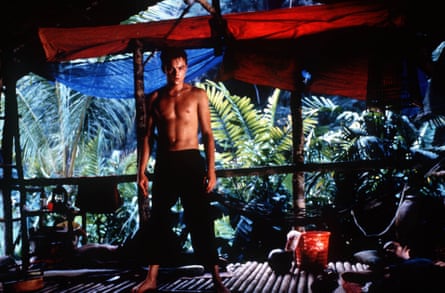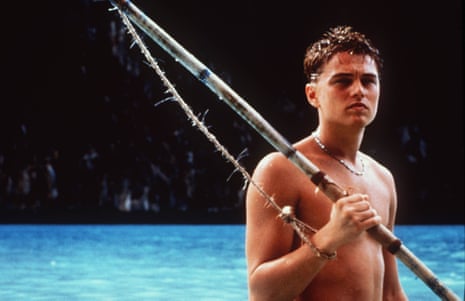In my mid-20s, in the early 1990s, I moved to west London from Scotland. I remember meeting them, at parties in Notting Hill flats, in nightclubs, at raves. They’d be tanned, unshaven and stoned and they’d be saying things like, “No, man, Koh Samui is over. Phuket is just touristville now. You have to go to … ” I was moving among the backpacking, one‑upping, (mainly rich) young things that Alex Garland would skewer in his fiction debut a few years later, when he was, enragingly, just 26 years old. (Enragingly to me, at any rate: I was struggling with the outline for my own first novel, whose eventual publication was still nearly a decade in the future.)
The Beach is a recollection told in the first person (“Thinking about Thailand tends to make me angry, and until I started writing this book, I tried not to do it”) and it is peppered with cataphoric references (“Considering that two of them ended up dead and the other ended up nuts, I feel bad that their names mean so little to me”): tropes of horror fiction that conspire to create a feeling of dread, a warning about what is to come. Garland’s narrator Richard arrived at the Britpop feast like the Ancient Mariner, had Coleridge’s cipher been raised on Platoon, The Simpsons and Nintendo.
The premise was simple and cleanly executed: in Bangkok a young traveller is given a map to a hidden beach by an older traveller, Daffy, who then kills himself. Having first made the mistake of copying the map for two American backpackers he has formed a casual acquaintance with (an act that will later have horrific consequences), Richard and his two new friends – Étienne and his lover Françoise – find the beach and the small community of travellers who have been living there for several years in a small, self-sufficient community that, at first, resembles Eden. Gradually, of course, Eden is revealed to have the dynamics of the playground. There are rivalries and tensions. There are alpha males, chest-beating and jockeying for position. And there are serpents: the drug lords who control the huge marijuana patch on the far part of the island. And then there is Richard himself …
He was not the kind of child who just built Airfix model aircraft. He was the kind of child who built Airfix models, stuffed them full of cotton wool, doused them in lighter fuel, set them on fire and then threw them from the highest window in his house. When on the island he kills a small shark, its death throes appear to him as “something out of a comic-book fight”. He knows how to deal with a certain situation because he had seen it done on the TV series about the Vietnam war, Tour of Duty. Stalking the guards who patrol the marijuana patch, he notes that the only thing missing is “a Doors soundtrack”, presumably exactly like the one that covers the bloody climax of Apocalypse Now. Learning to walk quietly through the jungle when on patrol, he gives himself “three lives” whenever he steps on a twig or makes a noise, “in deference to video games”. Disaffection, ennui, is built line by line, paragraph by paragraph. At one point, the characters sit, stoned, naturally, in front of a spectacular Thai sunset – “red sky faded to deep blue … orange light threw elastic shadows down the beach” – and Richard notes that they watch it “as intently as if we were watching television”. Television being the primary reality, the gold standard to which all others must be calibrated.
Richard’s disaffection gradually gives way to brutality, to the point where, halfway through the novel, on discovering a junkie couple on a beach, the man already dead from an overdose, he can say: “I wasn’t bothered about the guy because he’d come to Thailand and messed up, so that was his lookout.” His only concern is for the girl’s feelings when she wakes to find her friend, or lover, dead, so Richard makes fast work of hiding the body while she is still unconscious. It is a strange, surrealistic episode, unconnected to the plot, but it reveals the truth of what Richard may be capable of later. Another striking aspect of the novel is the strange absence of sexuality: a couple of dozen young people are living in close quarters in the middle of nowhere and – apart from an inconclusive flirtation between Richard and Françoise – there is almost no sex. It is something the movie adaptation tried – not wholly successfully – to address.

FNG, LZ, frag, DMZ, KIA … the Vietnam war terminology is relentless. And, most of all, “the World”: the term used in the novel to mean anywhere that is not the beach, but which was coined by US GIs in-country to designate home, America, anywhere other than Vietnam. For Richard, of course, all of this is second hand: mediated knowledge learned through film and books. Hermann Hesse and The Deer Hunter. A generation or two earlier, men in their late teens and early 20s had only gone to remote jungle countries to fight wars. They witnessed things many of them would never talk of, although some would write books about them: Tim O’Brien’s If I Die in a Combat Zone from the Vietnam war, just a generation before the one Garland writes about; Norman Mailer’s The Naked and The Dead from the Philippines campaign of the second world war, from the generation before that. The Philippines is another place Richard has travelled to. (And which Garland would revisit for his next novel The Tesseract. Coincidentally, The Naked and the Dead was published when Mailer was 25: around the age Garland was when he wrote The Beach. It is not a long list: enduring novels written by people in their mid-20s. Some of us may find comfort in this.) But, of course, Mailer’s generation came home with very different stories to tell. “I do not want to die here,” Étienne says to Richard, terrified as they hide from the armed marijuana farmers. The line is straight out of any number of war movies, spoken by the terrified grunt from Bakersfield or Pittsburgh as he cowers under gunfire in a hot LZ. However, for generation X in 1996, there were no wars to fight. Only the war against boredom.
And, ultimately, Richard is bored. He is bored that all his experience has been through a screen. He is eventually bored by the beauty of the beach, by all the fishing and the farming and the carpentry. As his psychosis deepens during his solo jungle patrols, and the blood-spattered Daffy starts appearing to him during his waking hours as well as his sleeping ones, he wants something to happen. He wants the confrontation that will come when the Americans and their friends arrive. He wants to be discovered by the marijuana guards. Like the bored grunt on his fifth non-event mission, Richard wants enemy contact, he wants some action. He wants that Doors soundtrack to kick in and the tracer fire to start tearing apart the jungle canopy.
And so does the reader. It is a neat trick of Garland’s narrative that the violence at the novel’s denouement lands not only as shock but as release.
“I don’t travel with a camera … My holiday becomes the snapshots and anything I forget to record is lost. Apart from that the photographs never seem to be very evocative.” (The Beach)
Strangely and fittingly, I find myself writing this on a beach in the Gulf of Thailand (Koh Samed, not a location Richard would have approved of: far too popular) and, looking up and down the sand, I can count half a dozen selfie sticks trembling in the air, and twice as many smartphones. Today, everyone travels with a camera.

It is at once easy and almost impossible to imagine the novel recast now, for the millennials, the children of the characters Garland wrote about two decades ago. Easy because, instead of looking at the sunsets and jungle outlines through the prism of Vietnam movies, instead of looking up from their Game Boys (Tekken, Sonic the Hedgehog, Alien 3, Super Mario … to the average teenager today the list of video game references in The Beach will read as archaically as a catalogue of relics from a pharaoh’s tomb) towards the sparkling water, they would be looking up from iPhones and laptops, they would be filtering their reality (literally, scrolling through “monochrome”, “fade”, “1970s” and all the other options in the bar at the bottom of the screen, or perhaps, daringly, not doing so and simply hashtagging the image with “nofilter”) through Instagram, Facebook and Twitter.
And it is almost impossible, because how can we imagine the book’s central premise surviving two minutes in the contemporary cyclone of location services enabled? Today, Daffy’s crude cartography would have been fed into Google Maps, then shared, retweeted and liked until something out of one of Garland’s future creation 28 Days Later happened: a zombie apocalypse of backpackers heading like a tidal wave for the beach within 48 hours.
Part of the novel’s astonishing success at the time (a bestseller and then a movie with the hottest director of the moment, Danny Boyle, and the biggest star in the world, Leonardo DiCaprio) was its hotwiring of the zeitgeist. By 1996-97, it wasn’t just the trust-fund kids from W11: everyone was backpacking in Thailand, Vietnam and Cambodia. But – as long-out-of-print works by everyone from Jack London to Terry Southern will attest – briefly touching the zeitgeist is no guarantee of still being in print 20 years later. What will the generation that reads the novel now, and those that come after them, find in its pages? They will find what generations before them found in the pages of F Scott Fitzgerald and Ernest Hemingway, as their protagonists drank and smoked and gazed at the landscapes of Italy, or Spain, or Africa: characters damaged by where they have come from, looking for release – or correction, or illumination – in strange new corners of the world and finding only disaffection, ugliness, self-absorption and ego.
Finding only the things they have brought with them.

Comments (…)
Sign in or create your Guardian account to join the discussion